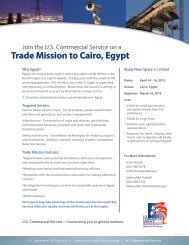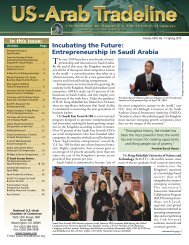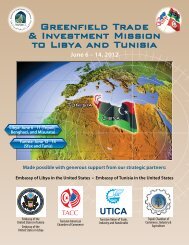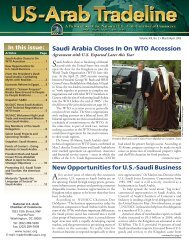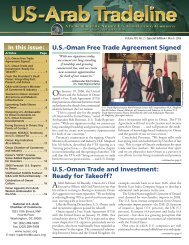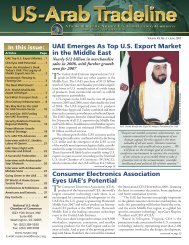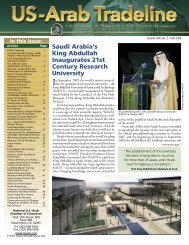Qatar - National US-Arab Chamber of Commerce
Qatar - National US-Arab Chamber of Commerce
Qatar - National US-Arab Chamber of Commerce
You also want an ePaper? Increase the reach of your titles
YUMPU automatically turns print PDFs into web optimized ePapers that Google loves.
ictQATAR – Streamlining <strong>Qatar</strong>’s Future<br />
In March 2009, <strong>Qatar</strong> placed 29th among<br />
the 134 countries that were surveyed for<br />
the Networked Readiness Index <strong>of</strong> the Global<br />
Information Technology Report 2008-2009.<br />
The annual report is produced by the World<br />
Economic Forum and INSEAD, and it is a<br />
comprehensive global assessment <strong>of</strong> the impact<br />
that ICT has on a nation’s global competitiveness.<br />
Since <strong>Qatar</strong> was first surveyed for the<br />
report in 2005-2006, the country has climbed<br />
steadily from 39th to 29th place in the rankings.<br />
Secretary General Dr. Hessa Al-Jaber (right) honoring one <strong>of</strong> 5<br />
winners in a competition sponsored by ictQATAR.<br />
Given the fact that <strong>Qatar</strong> is a relative<br />
newcomer in the race to achieve ICT-friendly<br />
societies, this is a notable achievement. “In<br />
just a few short years, we have begun to realize<br />
the rewards <strong>of</strong> information and communication<br />
technology,” explains Dr. Hessa Al-Jaber,<br />
Secretary General <strong>of</strong> the Supreme Council <strong>of</strong><br />
Information and Communication Technology<br />
– ictQATAR. “Since 2006, <strong>Qatar</strong> has jumped<br />
ahead in the index because both the public<br />
and private sectors are dedicated to leveraging<br />
ICT to help <strong>Qatar</strong> achieve its leadership role<br />
in the global economy,” adds Dr. Al-Jaber.<br />
ictQATAR was established in 2004 as the<br />
policy-making and regulatory body responsible<br />
for maintaining a national ICT strategy to<br />
help transform <strong>Qatar</strong> into a knowledge-based<br />
society. “Our mission is to create an advanced<br />
ICT community, where the community at<br />
large can use ICT to improve the quality <strong>of</strong><br />
their lives and actively contribute to the social<br />
and economic development <strong>of</strong> <strong>Qatar</strong>,” stated<br />
H.H. Sheikh Tamim bin Hamad Al-Thani,<br />
the Heir Apparent and Chairman <strong>of</strong> ictQATAR,<br />
during the inaugural launch in May 2005.<br />
During the last six years, the State <strong>of</strong> <strong>Qatar</strong><br />
has made strategic ICT investments across<br />
many sectors. In 2006, the telecommunications<br />
sector was liberalized, thereby opening<br />
the market to competition. Numerous initiatives<br />
were launched, such as e-government,<br />
e-education, e-health, e-inclusion, and<br />
30 N<strong>US</strong>ACC • www.nusacc.org<br />
e-security. <strong>Qatar</strong>’s first-generation e-government<br />
plan began in 2003, and it produced a variety<br />
<strong>of</strong> online services that have been incorporated<br />
into the present e-initiatives.<br />
ICT 2015, ictQATAR’s current five-year<br />
plan, has enumerated four goals central to a<br />
sustainable knowledge-based society: build<br />
an advanced ICT infrastructure, encourage<br />
public and private sector use <strong>of</strong> ICT, develop<br />
citizens’ e-skills, and foster research and<br />
development.<br />
Hukoomi – an easy-to-use online<br />
gateway to government information<br />
and services – has been described as an<br />
“historic milestone” because <strong>of</strong> its ability<br />
to link 50 government entities online<br />
at once. In one year, from 2008-2009,<br />
Hukoomi enabled four million electronic<br />
transactions. Hukoomi is the centerpiece<br />
<strong>of</strong> ictQATAR’s effort to create a transparent<br />
and streamlined government.<br />
<strong>Qatar</strong> is already reaping the benefits<br />
<strong>of</strong> integrating ICT into many aspects<br />
<strong>of</strong> the country’s public and private daily<br />
life. In the resident population (excluding<br />
the transient labor population), internet<br />
penetration is 63 percent, and 54 percent <strong>of</strong><br />
residents are computer users. There are 88<br />
PCs per 100 government employees, and 95<br />
percent <strong>of</strong> all physicians and 78 percent <strong>of</strong> all<br />
nurses have internet connections in government<br />
hospitals and health centers. More than<br />
90 percent <strong>of</strong> all businesses in <strong>Qatar</strong> have<br />
internet connections, with the exception <strong>of</strong><br />
micro-businesses, which register 41 percent<br />
internet availability.<br />
The Government <strong>of</strong> <strong>Qatar</strong>’s commitment<br />
to build a world-class educational system is<br />
evident. <strong>Qatar</strong> ranks highest in the MENA<br />
region with 12.7 PCs per 100 students in<br />
schools, and many <strong>of</strong> the most advanced ICT<br />
efforts are directed toward improving the<br />
primary and secondary educational system.<br />
Knowledge Net, for example, is a portal that<br />
enables three-way communications among<br />
parents, schools and teachers. E-schoolbag,<br />
Global Gateway, and Model e-school are<br />
additional programs designed to introduce<br />
state-<strong>of</strong>-the-art ICT educational practices to<br />
local schools.<br />
One <strong>of</strong> <strong>Qatar</strong>’s most high-pr<strong>of</strong>ile endeavors<br />
is Education City. Sprawling across 14 million<br />
square meters (150,694,746 square feet), this<br />
project houses educational facilities from<br />
grades one through post-graduate, and it<br />
includes branch campuses <strong>of</strong> some <strong>of</strong> the<br />
world’s leading universities.<br />
“The rapid growth <strong>of</strong> Education City and<br />
the diversity <strong>of</strong> its operations meant that it<br />
was only a matter <strong>of</strong> time before it outgrew<br />
its original network,” explains Sa’di Awienat,<br />
<strong>Qatar</strong> Foundation’s Information Technology<br />
“Our mission is to create an<br />
advanced ICT community, where<br />
the community at large can use<br />
ICT to improve the quality <strong>of</strong><br />
their lives and actively contribute<br />
to the social and economic<br />
development <strong>of</strong> <strong>Qatar</strong>.”<br />
H.H. Sheikh Tamim bin Hamad Al-Thani,<br />
Chairman <strong>of</strong> ictQATAR<br />
Director. “We are on an endless journey to<br />
design and implement innovative ICT solutions<br />
that fulfill the growing needs <strong>of</strong> our customers<br />
and enable our elite universities and the worldclass<br />
research centers to operate.”<br />
This “journey” led to the creation <strong>of</strong> Meeza<br />
(“advantage” in <strong>Arab</strong>ic), a managed IT services<br />
and solutions provider, formed as a commercial<br />
joint venture between Cisco and the <strong>Qatar</strong><br />
Foundation. Meeza, in turn, will monitor and<br />
manage the region’s first<br />
Research and Education<br />
Network (REN), a new<br />
state-<strong>of</strong>-the-art, 40<br />
Gbps-ready fiber<br />
optic network that<br />
w i l l c o n n e c t<br />
r e s e a r c h a n d<br />
academic institutes<br />
in <strong>Qatar</strong>, as<br />
well as provide<br />
access to other<br />
international<br />
research facilities.<br />
“This network will support our<br />
world-class universities here at <strong>Qatar</strong> Foundation<br />
and help us prepare the next generation<br />
<strong>of</strong> leaders,” says Rashid Al Naimi, Vice President<br />
for Administration at <strong>Qatar</strong> Foundation.<br />
“Additionally,” he notes, “it highlights the<br />
important role that IT service providers such<br />
as Meeza will play in furthering the development<br />
and success <strong>of</strong> <strong>Qatar</strong> as a knowledgebased<br />
society.”



